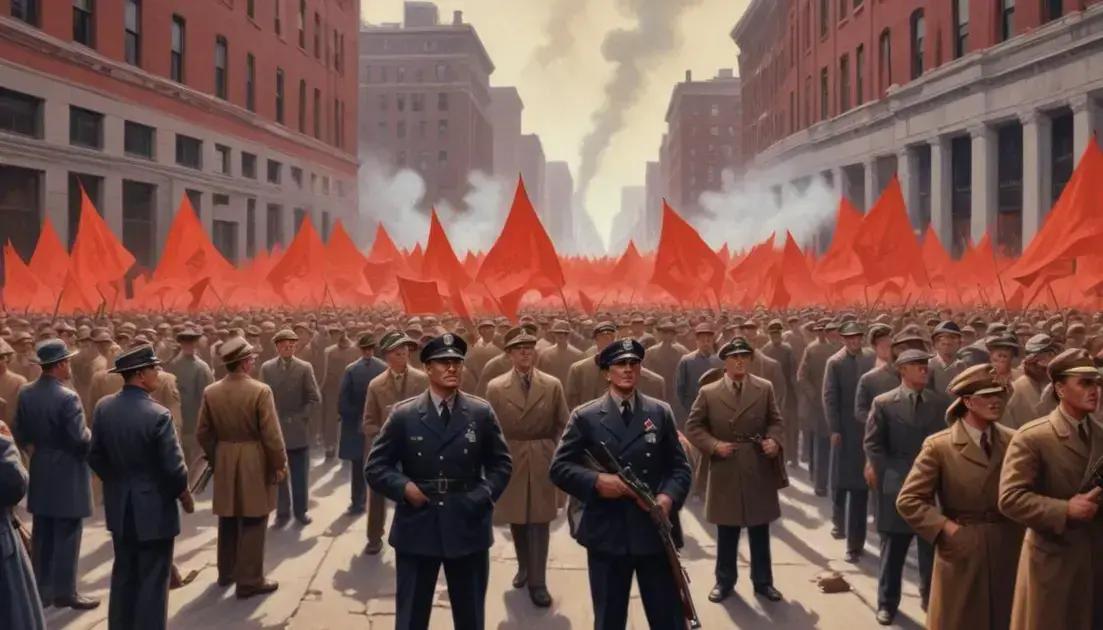
Literature in the Cold War: writing under fear
Literature plays a crucial role in political discourse by challenging societal norms and sparking essential conversations. Influential authors like George Orwell and Ray Bradbury used their works to voice dissent and raise awareness about censorship and oppression during the Cold War. Through storytelling, literature fosters understanding and empathy, connects diverse experiences, and inspires action for social change, making it a powerful tool for influencing public opinion and promoting freedom of expression.
Cold War literature emerges from a time when writers faced extreme censorship and ideological battles. Curious how words could defy oppression? Let’s dive in!
The Impact of Fear on Creative Expression
The Cold War was a time of intense fear that affected many areas of life, including art and literature. Writers often felt pressure from governments to censor their work. They faced the risk of persecution if their ideas strayed too far from accepted norms.
How Fear Shapes Creativity
Fear can limit creativity, but it can also spark it. Many authors took risks to express their true thoughts. They found ways to cleverly hide their messages. This made their work not only powerful but also fascinating to read.
Examples of Impacted Writers
Writers like George Orwell and Ray Bradbury dealt with the fear of censorship by creating stories that challenged authority. They used fiction as a safe way to explore complex themes. These stories still resonate today and remind us of the struggles they faced.
Art as Resistance
For many artists, creating work during the Cold War was a form of resistance. Their art often highlighted the struggles of ordinary people under oppressive regimes. Through their creativity, they offered new perspectives on society.
The Legacy of Fear in Literature
The impact of fear on creative expression continues to be felt today. Many writers draw inspiration from the past, exploring themes of freedom and expression. This connection reminds us of the importance of art as a tool for change.
Resistance Through Literature
During the Cold War, literature became a powerful form of resistance. Writers often used their words to challenge oppressive systems. They created works that spoke truths that were hard to ignore.
Literature as a Voice
Writers like Orwell and Solzhenitsyn wrote about the struggles people faced. Their books highlighted injustices and pushed readers to think critically. Through their characters and stories, they showed the human side of oppression.
Symbolism and Metaphor
Many authors used symbolism to convey deeper meanings. For instance, a character’s struggle might reflect a nation’s fight against tyranny. This clever use of language allowed writers to share their ideas without being direct about it.
The Role of Dissenting Voices
Dissent was crucial during this era. Writers who expressed their thoughts faced real dangers. Yet, their courage inspired others to stand up and speak out. This brave act of writing helped shape society’s views on freedom and rights.
Influence on Future Generations
The resistance seen in Cold War literature impacts today’s writers. Many still draw inspiration from those past struggles. They understand that literature can provoke thought and inspire change, even today.
Censorship and its Challenges
Censorship poses many challenges for writers and artists. During the Cold War, many faced strict limitations on what they could say. This affected how they expressed their thoughts and ideas.
Understanding Censorship
Censorship involves controlling what information can be shared. Governments might ban books or articles that they find too controversial. This makes it hard for writers to share their true feelings.
Writers’ Responses to Censorship
Many writers found creative ways to bypass censorship. They often used symbolism or metaphor in their work. This allowed them to share powerful messages without facing direct consequences.
The Impact on Literature
Censorship influenced the themes found in Cold War literature. Many stories focused on the struggles of oppression. These themes still resonate with readers today, showing the impact of those challenges.
Facing Modern Censorship
Even today, censorship remains a problem in many countries. Writers must continue to fight for freedom of expression. It’s important for societies to protect the voices of those who dare to speak out.
Influential Writers of the Era
Several writers became influential during the Cold War. Their works continue to inspire readers today. They tackled big issues like freedom, fear, and censorship.
George Orwell
George Orwell is perhaps the most well-known figure. His book, 1984, explores themes of surveillance and control. It remains relevant, showing the dangers of totalitarianism.
Ray Bradbury
Ray Bradbury offered a unique take on censorship in his book, Fahrenheit 451. He imagined a future where books are banned and “firemen” burn them. This powerful story warns against the loss of knowledge.
Alexander Solzhenitsyn
Alexander Solzhenitsyn shared his experiences in Soviet labor camps. His book, The Gulag Archipelago, exposed the harsh realities of political oppression. This brave act of writing shone a light on human rights abuses.
Other Notable Authors
Many other authors also contributed to the literary landscape. Writers like Sylvia Plath and Kurt Vonnegut voiced the struggles of the time. Their stories connected deeply with readers, opening up conversations about personal and political issues.
The Role of Literature in Political Discourse
Literature plays a vital role in political discourse. It can challenge ideas and spark important conversations. Through stories, writers can address social and political issues in a powerful way.
Expressing Dissent
Many authors have used their works to express dissent. They voice their concerns about government actions and societal norms. This helps readers understand different perspectives on politics.
Shaping Public Opinion
Books, poems, and essays often shape public opinion. They encourage readers to question the status quo. For example, works like Brave New World provoke thoughts about freedom and control.
Bridging Differences
Literature can also bridge differences between people. Diverse voices in writing show the varied experiences of society. This helps to foster empathy and understanding among readers.
Inspiring Action
Many stories inspire action and engagement. They motivate people to become involved in their communities. A powerful novel can lead to rallies, discussions, and even political movements.
Conclusion
In conclusion, literature has always played an important role in shaping political discourse. Through the power of storytelling, writers challenge ideas and inspire readers. They help express dissent and give a voice to the unheard. Influential authors have used their works to shed light on important social issues.
Additionally, literature encourages empathy and understanding in a world full of differences. By sharing diverse experiences, it connects people and inspires action. As we continue to explore these writings, we realize their impact can lead to positive change. Thus, we should value literature as a vital tool in our ongoing journey toward a better society.


